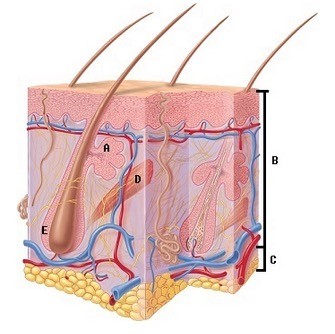A person with type A blood has ________.
A. anti-A antibodies
B. no antigens
C. anti-B antibodies
D. A and B antigens
Answer: D
You might also like to view...
Circular folds are
A) ridges in the wall of the stomach. B) pleats in the lining of the small intestine. C) fingerlike projections on the surface of the mucosa of the small intestine. D) sacculations in the colon. E) abnormal structures formed by excessive pressure in the small intestine.
When pure water is consumed,
A) the ECF becomes hypertonic to the ICF. B) a fluid shift occurs and the volume of the ICF decreases. C) osmolarities of the two fluid compartments fall. D) the volume of the ECF decreases. E) the volume of the ICF decreases.
Sympathetic vasoconstriction of the afferent arterioles and a resultant fall in the GFR occur as part of the baroreceptor reflex response when the blood pressure is too low
Indicate whether the statement is true or false
 What does structure "E" represent on the diagram?
What does structure "E" represent on the diagram?
A. Arrector pili B. Sebaceous gland C. Epidermis and dermis D. Subcutaneous tissue E. Hair follicle